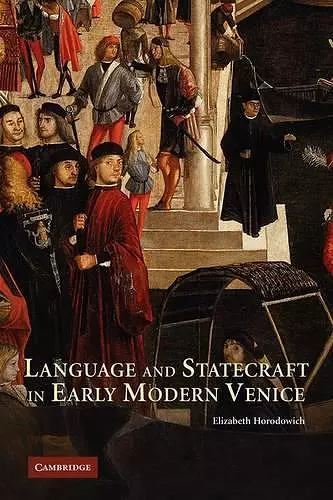Language and Statecraft in Early Modern Venice
Format:Paperback
Publisher:Cambridge University Press
Published:3rd Mar '11
Currently unavailable, and unfortunately no date known when it will be back

This book demonstrates that a crucial component of statebuilding in Venice was the management of public speech.
While historians typically describe the state as emerging through a wide variety of processes and structures such as armies, bureaucracies, and administrative organizations, this book demonstrates that a crucial but unrecognized component of statebuilding in Renaissance Venice was the management of public speech: controlling foul language. Ideas about language were deeply embedded in Venetian political culture. Instead of studying the history of language through literary, printed texts, Horodowich examines the speech of everyday people on the streets of Renaissance Venice by looking at their actual words as recorded in archival documents. By weaving together a variety of historical sources, including literature, statutes, laws, chronicles, trial testimony, and punitive sentences, Horodowich shows that the Venetian state constructed a normative language – a language based not only on grammatical correctness, but on standards of politeness, civility, and piety – to protect and reinforce its civic identity.
“Language and Statecraft in Early Modern Venice will appeal to literary scholars in its attention to rhetoric, language, and speech acts, as well as its focus on the body and etiquette; it will appeal to cultural historians in its rich use of different sources, its colorful, textured vision of the society and ‘everyday life,’ its attention to different strata of society and the connections among them, and its focus on the social history of speech; it will appeal to political historians in its focus on statecraft; and it will appeal to social historians in its mining of the archives and careful evaluation of how to use the sources uncovered. This is, in sum, a fascinating, sophisticated, wide-ranging, and beautifully written book.” -Douglas Biow, University of Texas, Austin
“Elizabeth Horodowich’s subject is the talk of Renaissance Venice and in this book she finds stimulating meanings in the conversation of Venetians of every category, patrician and popular, rich and poor, female and male. Threaded throughout Horodowich’s discussions of speech of all kinds is a provocative thesis: that the patrician government sought to discipline the use of words in order to enforce a cultural Venetianness that sustained its regime. She braces this original account of the Venetian government’s social policy with a sophisticated theoretical framework. But the main achievement of the book is a vivid and comprehensive examination of the entire linguistic circulatory system of Renaissance Venice.” -Stanley Chojnacki, University of North Carolina at Chapel Hill
“Speech and language were important elements in early modern culture. Civic life was maintained and managed through civil conversation, much as the internet and blogs have come to figure in current discourse. Blogs, however, are largely unregulated; civil conversation in the past was an object of intense governmental concern. Perhaps nowhere was that more true than Venice. Elizabeth Horodowich's study links notions of proper speech and prosecutions of improper or dangerous speech acts (blasphemy, insult, malicious gossip) with Venetian political processes and construction of civic identity. Mining a rich variety of sources, especially judicial, to get as close as possible to actual speech, she shows how Venetian officials' attempts to control speech were aimed primarily at the poor and foreigners, those whose belonging to the civic order were most in doubt.” -Thomas Kuehn, Clemson University
“Language and Statecraft in Early Modern Venice establishes a fresh context for a number of subjects that have dominated early modern and Renaissance scholarship over the past generation. Elizabeth Horodowich’s analysis of blasphemy, insults, and gossip elegantly demonstrates that the relationship between language and state power was always paradoxical. Gossip was widely denounced in the theoretical literature as the untrustworthy manifestation of female speech, but male gossip in the form of bargaining for favors had a powerful political value. The book will become a model for reinterpreting how citizens spoke to power in the early modern world.” -Edward Muir, Northwestern University
ISBN: 9780521178365
Dimensions: 229mm x 152mm x 15mm
Weight: 380g
258 pages